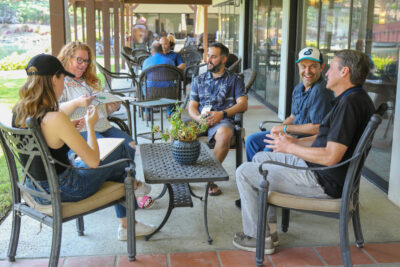
Pastoral Burnout – Pete Briscoe
In November 2021, Barna reported that nearly 2 in 5 pastors had considered quitting ministry. As of 2022, that number has risen to nearly 42%
Do you feel God pushing you into a new season of life? Pastor Pete Briscoe felt that push to make a bold move and leave pastoral ministry after 28 years at Bent Tree Bible Fellowship. In this interview, Pete Briscoe shares the challenges behind pastoral burnout and loneliness, and offers advice on how pastors can protect their energy to get through isolation and navigate difficult seasons.
What Causes Burnout In The Church
In November 2021, Barna reported that nearly 2 in 5 pastors had considered quitting ministry. As of March 2022, the percentage of pastors who have considered quitting full-time ministry within the past year has risen to nearly half (42%). A 13 point increase in less than a year seems shocking, but not to Briscoe.
When asked about the 2021 Barna report, Briscoe responded, “Candidly, I think they’re probably on the low end from what I’m experiencing in my conversations with pastors on the ground.” He continues, “A pastor’s job is generally somewhat stressful. But you add on top of the general stress of the pastor’s world, a pandemic, where whatever decision you make, half the church is mad at you.”
Over the past few years, there has been “all of this injected disunity that pastors have to figure out and sort through” Briscoe notes. From responding to masks, to vaccines, to returning to in-person services, there was no winning in decision-making. Briscoe says, “There are people struggling with illness. There are cultural conversations around racism and politics, and all of this is injected into the church. Pastors are trying to juggle that and navigate.”
In addition to the disunity, chaos, and sudden changes the last few years have brought, there’s the pressures and stressors that have always existed for pastors. Briscoe listed off always being on call, not wanting to disappoint people, and financial stress as just a few of those burdens weighing on leaders today, and motivators to quit ministry. With all of those factors, Briscoe says, “It’s not hard to imagine a pastor waking up one morning and going, ‘Why am I doing this? What’s the point?’”
Ultimately Briscoe believes that “People in ministry are there to serve and to love people. They feel self-conscious talking about money and so they don’t ever ask for help. Then you can see how [burnout] happens.”
The easiest ways to prevent burnout are to ask for help and stay focused on what’s within your normal job description. Briscoe recalls advice from one of his seminary professors: “Every time you say yes to something outside your normal job description, you’re saying no to your family.”
And that truth still resonates with Briscoe. He elaborates, “Pastors do it all the time. They feel like they’re serving their people, but at the end of the day it’s them and their family that suffers.”
For Briscoe, after a 90 day leave of absence, he found clarity in his calling. He says, “I came to the conclusion that I could not stay in that role and be healthy. So I chose to be a healthy person over a megachurch pastor, and it was an incredibly hard choice.”
Leadership is Lonely
Briscoe admits he’s painfully aware how isolating and challenging being a leader can be. He says, “I became quite isolated. Our church grew large, had a great team, and I was able to focus on preaching and leadership. I had the ‘dream job.’ I got isolated, and alone.”
Not every day was bad, but loneliness and tough times came in cycles. Briscoe says, “I would start to go into a dark place and not talk to anyone, go to therapy, or have a counselor. Over the years as the church grew, the pressure grew, those cycles got deeper and more frequent.”
The cause of these cycles of loneliness for Briscoe and other church leaders are from an unhealthy perspective of the role on the pastor’s part. He notes that pastors convict themselves. “We have to be the point person out front. When inevitably something comes up that isn’t in line [with the perfect pastor persona], we find ourselves hiding it and struggling, and don’t want anyone to know. We keep people at arms length.” He remembers that although it was never directly taught, the idea of never being close friends with someone in your church was commonly found in seminary. He notes that “It undercuts your pastoral authority and relationship with them.” But at what cost? Briscoe continues, “The healthy thing would be to go to someone and ask for help and move forward.”
Moving From Achievement Burnout to Fulfillment
Briscoe notes that many leaders “have figured out the science of achievement but struggle with the art of fulfillment.”
As a previous megachurch pastor, Briscoe continues to spend his time ministering, and also coaching leaders. He says, “I used to stand in front of thousands, but now I sit across from one. It goes much deeper, and we’re able to get into the nooks and crannies of life.”
He works with clients to help identify thoughts and redirect them and move forward. Briscoe says that our decisions are influenced by our life: the environments we grow up in, our families and things that happen to us. He says, “All of this creates patterns in our lives that we’re not even aware of sometimes. We dig troughs in our brains—neural pathways—and we have to recognize what those are to help break those patterns. Briscoe jokes, “It’s not rocket science. It’s brain science, but not rocket science.” But this brain science may be the key to finding fulfillment.
As Briscoe coaches leaders, they use their one-on-one sessions to “figure out what thoughts are driving [client’s] feelings and behaviors and their results. And then helping them sort through those thoughts and come up with different ones to take them to different places.”
The hope Briscoe shares with his clients is that it’s possible to learn how to pattern their lives around emotional, relational, and spiritual health while creating a path forward. Leaders don’t have to feel alone, isolated, or burnt out.
Listen to this episode of Pushpay’s Moving Mountains podcast and find hope in the face of burn out!
For more resources and help around burnout in the Church, visit:





